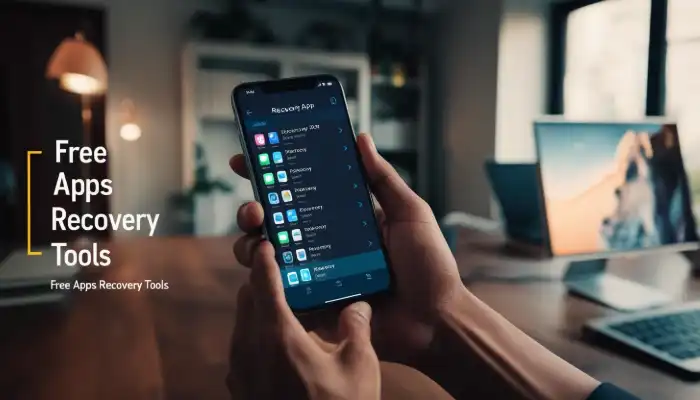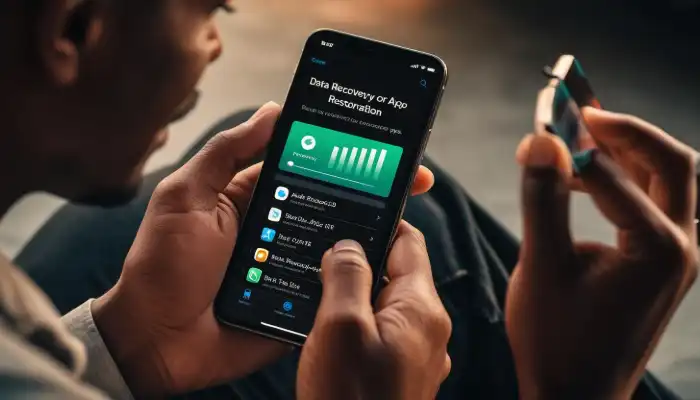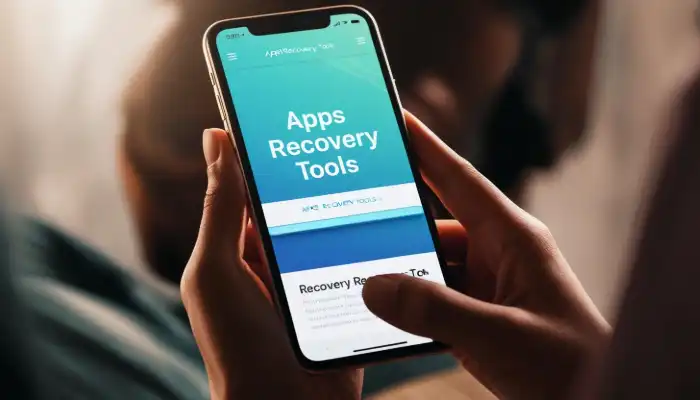In the event of losing an app on your smartphone can be a frustrating experience in particularly when you depend on it every day. If it’s accidental deletion of an app, system updates, or even a reset of your device, but losing an app doesn’t necessarily mean that it’s lost forever. Apps Recovery can be the remedy that allows the restoration of deleted apps with minimal effort.
Whether you’re on Android or iPhone, various free tools are available to help you recover those lost apps. In this article, we’ll dive into how apps recovery works, the best tools to use, and tips to prevent future app loss.

What is Apps Recovery?
Sometimes we accidentally delete important apps. Other times, a phone reset or system update wipes out apps we didn’t intend to lose. This is where apps recovery comes in—it helps restore those apps without hassle.
Whether you’re dealing with android app recovery or need iPhone app recovery, knowing how to recover deleted apps can save time and stress.
Common Causes of App Loss:
- Accidental deletion
- Factory reset
- Software update failure
- Malware or virus attack
- Switching devices without backup
Whether it’s accidental deletion or a system update, apps recovery ensures your valuable apps are never truly lost. With the right tools, restoring your apps is quick, easy, and stress-free.
Top Free App Recovery Tools You Can Use
When looking for free app recovery tools, it’s important to consider your device type and whether root access is needed. Some tools support app recovery without root, while others offer deeper scanning features with root access.
Free App Recovery Tools Comparison
| App Name | Platform | Root Required | Best For |
|---|---|---|---|
| DiskDigger | Android | Optional | App recovery without root (basic scan) |
| EaseUS MobiSaver | iOS | No | iPhone app recovery |
| Dumpster | Android | No | Acts as a recycle bin |
| PhoneRescue | Android/iOS | No | Deleted app recovery, messages, files |
| App Backup & Restore | Android | No | Preventive backup and restore |
Choosing the right free app recovery tool depends on your device and recovery needs. Tools like DiskDigger, EaseUS MobiSaver, and PhoneRescue offer effective solutions for restoring lost apps effortlessly.

How to Use Apps Recovery Tools to Restore Deleted Apps?
Let’s walk through how to recover apps step-by-step, whether you’re on Android or iPhone. Follow these instructions based on your device:
Android App Recovery (No Root)
Most modern tools now offer app recovery without root, making the process simple and secure.
Steps to Recover Deleted Apps on Android:
- Download DiskDigger or Dumpster from the Google Play Store.
- Launch the app and select “App Data” or “Deleted Apps.”
- Start the scan—basic scans don’t require root.
- Preview recoverable apps.
- Tap “Recover” to restore apps.
Tip: For a deeper scan, rooted devices can access even system-level deletions.
iPhone App Recovery
Apple users can easily perform iPhone app recovery via the App Store or with third-party tools.
Steps to Recover Deleted Apps on iPhone:
- Go to the App Store.
- Tap on your profile icon at the top.
- Select “Purchased” > “Not on this iPhone.”
- Browse or search for the deleted app.
- Tap the download icon to reinstall.
Recovery of deleted applications is simple using the appropriate tools. If you are using DiskDigger for Android and App Store on iPhone, Store on the App Store for the iPhone following these easy steps can allow you to restore the apps you have deleted without hassle.

Best Practices and Apps for Smooth Recovery
To prevent loss of apps for the future, adopting appropriate practices and tools is essential. Backup tools such as Helium, as well as Google Drive, can ensure that your applications are secure and easy to recover.
Top Apps for App Backup and Recovery:
- App Backup & Restore – Automatically backs up your apps
- Helium App Sync & Backup – No root required, syncs to cloud
- Google Drive – Backs up app data with your Google account
Best Practices to Prevent App Loss:
- Turn on auto-backup for apps and data.
- Use cloud syncing whenever available.
- Periodically check Google Play/App Store history.
- Install a recovery tool like Dumpster to act as a recycle bin.
- Keep your phone updated to prevent system-based app deletions.
By following best practices such as auto-backups, using cloud syncing, and keeping your device updated, you can ensure your apps are always protected and easily recoverable whenever needed.
Tech Behind Apps Recovery Tools
Many of today’s advanced recovery tools rely on machine learning to scan for recently deleted or hidden app traces. Some even use natural language processing to identify app-related logs or metadata during deep scans.
Other tools utilize text classification algorithms to sort app data into categories like contacts, media, and apps, speeding up the recovery process.
Key Technologies Used:
- Machine Learning – Improves detection and prediction
- Text Classification – Categorizes app-related data
- Data Mining – Helps extract lost or hidden files
These features make modern apps recovery tools faster and more effective than ever before.
Quick Summary: Apps Recovery Essentials
| Feature/Tool | Android | iPhone | Notes |
|---|---|---|---|
| App recovery without root | Yes (Dumpster, DiskDigger) | No (not needed) | Android only |
| Free app recovery tools | Yes | Yes | Varies by app |
| iPhone app recovery | No | Yes (App Store, EaseUS) | Use with iCloud or tools |
| Android app recovery | Yes | No | Google Play History, DiskDigger |
| Deleted app recovery | Yes | Yes | Use PhoneRescue for both |
The technology behind apps recovery tools, including machine learning and text classification, has significantly enhanced their efficiency. These advancements ensure faster and more accurate app recovery, making them highly effective for all users.
Conclusion
Whether you’ve accidentally deleted an app or lost data after a reset, apps recovery solutions are here to help. With tools like DiskDigger, EaseUS MobiSaver, and Dumpster, you can quickly recover your lost apps—no stress, no root required.
Remember to follow best practices like regular backups and using cloud sync to avoid future data loss. The combination of smart tools and simple habits makes app recovery without root a reality for most users.